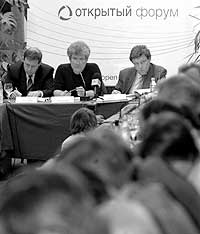The Russian state is the main obstacle to economic growth
and the creation of a favourable
 |
|
Andrei Illarionov (left) and Grigory Yavlinsky
(right) agreed that the authorities should not prosecute business.
Photo by Mikhail Zimmering, Nezavisimaya Gazeta
|
investment climate in Russia. As long as law enforcement agencies are virtually
uncontrolled and can blackmail businessmen and participate in the redistribution
of property, any qualitative improvement in the situation is out of question,
something noted by virtually all the politicians and political scientists
at the meeting of the Open Forum Club devoted to the prospects of Russia's
economy and the problems of relations between the authorities and business.
According to the YABLOKO leader Grigory
Yavlinsky, these problems are attributable to the "replacement
of public institutions by bureaucratic corporations" that discuss
economic strategies in the absence of a public discussion. Competition
is also being replaced by corruption, and "contacts with shareholders
are replaced by contacts with the police."
State officials and bureaucrats cannot foresee all the implications
of their decision-making. Politics Foundation President Vyacheslav Nikonov
says that half the civil servants in Russia have held their current positions
in the administration since the Brezhnev era. "Natural processes
will resolve the problem within a decade," Nikonov said. "We
rely on them to do more than we can rely on administrative reforms."
Outlining the barriers preventing economic growth and investment appeal,
Nikonov mentioned the lack of any clear development strategy and insufficiently
ambitious objectives.
"Some people believe that the proclaimed doubling of GDP is something
fantastic," Nikonov said. "When this has been achieved, however,
we will only have caught up with Taiwan in terms of GDP, and the truly
advanced countries will remain far ahead of us. The sheer size of the
national economy necessitates more ambitious goals."
Presidential Adviser Andrei Illarionov agreed with Nikonov that doubling
GDP is a fairly simple task. "Over the last 50 years 70 countries
out of the 140 countries on which information is available doubled their
GDP in a decade," Illarionov said. The adviser does not object to
GDP growth through development of the raw materials sector, which has
seen considerably higher growth rates than in the processing industry.
Obviously the idea of natural rent that has been discussed intensively
by the upper echelons of the state authorities is related to this fact.
However, Illarionov said that "it does not matter in terms of ideology
whether we take out $2 billion or $25 billion. If we re-distribute these
revenues between everyone, we will end up with Socialism, and develop
some sectors at the expense of others." Yavlinsky agreed: "The
rent is an abstract category. In reality we are speaking here about taxes
for the raw-material sector, which exist anyway. They can be raised, but
the problem is whether companies would want to work in such conditions."
According to Yavlinsky, there is no point in resolving the problems in
some sectors, by putting tax pressure on other people.
"Now we face the problem of the quality of economic growth, noted
Yavlinsky. - Now we are experiencing the growth without development, that
is unproportional and inadequate with no impact on either social or economic
issues." According to Yavlinsky, growth in the raw material sector
should provide an impetus for the development of other industries. Russia,
however, lacks the necessary institutions - the financial markets and
banking system are underdeveloped. "I don't know how much money we
require in terms of foreign investments: we do have internal recourses
and reserves, but investments do not grow," noted Yavlinsky. He thinks
that the development of the national economy is also impeded by the lack
of any independent judiciary, independent legislative authority, fair
elections, civil control over the secret services, and the absence of
separation between the authorities and business.
"What are we thinking about if it takes a court in Moscow only
90 seconds to examine the lawfulness of searches in the offices of a company?"
asked Yavlinsky.
Speaking about the failure of the state to ensure equal rules for everyone,
the participants of the forum kept returning to the anti-YUKOS campaign
launched by the law enforcement agencies.
"Transparency is the major problem of the company," said Alexander
Konovalov, President of the Institute of Strategic Evaluations and Analysis.
"YUKOS began publishing its financial report in line with international
standards, and these standards are the last thing Russian bureaucracy
needs."
According to Yavlinsky, institutions should be established that are
independent of the state authorities and the gap between legislation and
reality should be bridged, to make it possible to change the quality of
economic growth in the country. "The country as a whole and the world
know what political party has the president's sympathies, noted Yavlinsky,
- However, the law does not permit him to say it openly."
According to Yavlinsky, laws should reflect reality rather than what
we think desirable. In addition, we need "a complete legislative
legitimization of developments in the 1990s," noted Yavlinsky referring
to the idea of revising the privatization results. Society can only accept
such legimatisation if it is part of a package with "powerful social
laws", such as the Single Social Allowance law, which would make
it possible to liquidate poverty in the country. "Finally, something
should be done about the state monopolies," added Yavlinsky. "Current
developments are simply scandalous. The state monopolies are in the pocket
of the authorities and consequently resent so much their reorganisation."
See also:
Russian Economy
YABLOKO
Against Corruption
YUKOS Case
|